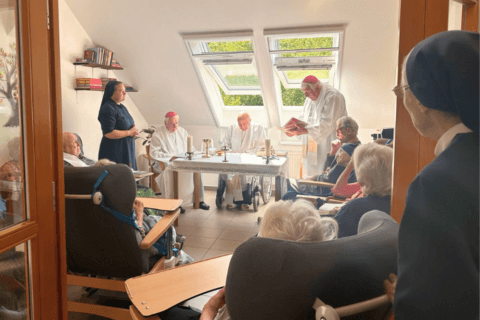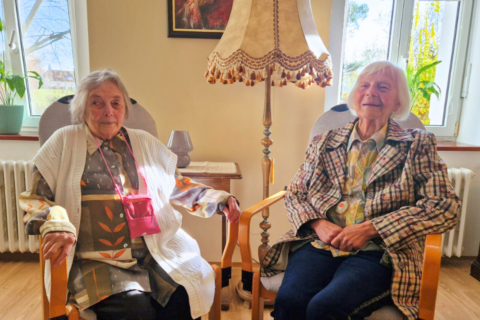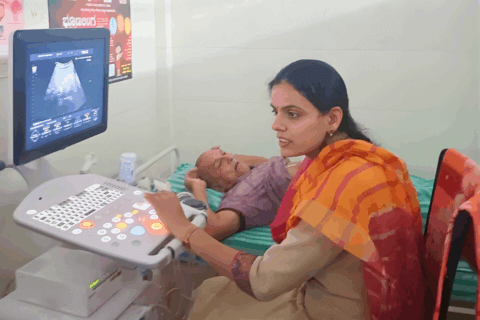From Mukařov Senior Home: Individual Care is Essential

On the occasion of International Day of Older Persons (October 1), we spoke with ALENA HANKOVÁ, director of Mukařov Senior Home. In our interview, she shared insights about their approach to daily senior care and how crucial individualized care is for them.
What do you consider key to providing quality care for seniors?
In our home, we emphasize that care should not be uniform. Each client is different and needs an individual approach. It’s not just about helping with hygiene, cleaning, or meals, but about providing comprehensive support in their lives. Our goal is for clients to feel at home, not like they’re in an institution. Clients are very different – some prefer a caregiver who sings while working and brings a cheerful atmosphere, while others prefer a quiet caregiver who comes in, does what’s needed, and lets the client contemplate in peace.
You mention individualized care. How does this manifest in practice?
The individual approach permeates all activities. For people to feel good, care cannot be guided exclusively by general procedures or charts. Each client has their specific needs and wishes, not only in terms of caregiver approach but also in areas like diet. Food is an important joy in seniors‘ lives – some love lots of vegetables, others prefer traditional potatoes with cottage cheese, and some look forward to exotic dishes because they traveled or worked abroad. It’s impossible to unify care into some average form that would suit everyone.
Does this diversity bring any challenges?
Diversity is a wonderful thing; each caregiver brings a different atmosphere, and seniors look forward to seeing who will be on shift that day. However, it’s true that it’s not always possible to meet everyone’s wishes and moods. When a client complains, it’s actually good because it means they care about how their day will be. We then discuss their wishes, talk about what’s important to them – it’s like in a family or any human coexistence. As long as people need to maintain their quality of life, it’s a good sign.
Do you sometimes find that seniors feel resigned? How do you respond to that?
Yes, such situations aren’t unusual, especially with people who have been through several healthcare facilities. Recently, we had a client who had gone through surgery, follow-up care, rehabilitation, and long-term care, and we were the fifth facility in line. She had no great expectations because she was used to being treated merely as an object of care everywhere. Such a person is often resigned, saying they just want to die. We need to work with them, motivate them. Change usually comes when a client develops an attachment to something specific, an activity or person in the home they start looking forward to. It might be spending time in the garden, contact with pets, or a favorite staff member. Then they literally blossom. Suddenly, even those who had no idea how to enjoy their senior years know what they want. After two or three months, they realize they’re at home here. The human connection they experience helps them take interest in things around them again.
What role does spiritual care play in your clients‘ lives?
Spiritual care is enormously important and is one of the reasons why people choose our home. Ensuring that a senior is fed, dry, and in a clean environment isn’t enough. True fulfillment comes from spiritual experiences. It’s a great support for them to have the opportunity to attend mass, talk with the priest, or sit with the Bible. Even people who weren’t actively religious during their lives often return to spirituality in their senior years. This dimension of care gives meaning and fulfills their lives.
Life in faith and returning to traditions give seniors inner peace and fulfillment. But how do they perceive the world around them? Do they ever feel disconnected from the modern world? Do they use modern technologies in their lives?
Contrary to popular belief, many of our seniors embrace technology enthusiastically. Technology allows them to Skype with relatives living abroad or stay in touch with grandchildren through social media. We also have clients who write articles or books on computers here. For example, Associate Professor Milan Malinovsky, a notable linguist, continues to work on his articles for academic journals here.
The relationship with technology is again very individual – some prefer to use landlines, others notebooks, tablets, or smartphones. We try to provide each person with what suits them best.
What message would you like to share on the occasion of International Day of Older Persons?
I would like to remind everyone that old age is a time when we deserve dignity, care, and respect. Our goal is for our clients to experience their senior years fulfillingly and joyfully. Each of them is unique to us, and that’s exactly how we approach them.
Podpořit Domov pro seniory můžete i vy!
Pomocí vašeho bankovního účtu můžete zaslat libovolnou částku. Každý dar je důležitý.
Číslo účtu:
749986/5500
Variabilní symbol:
64
Na co váš příspěvek využijeme?
- Obnovíme kompenzační pomůcky, které dosloužily.
- Pomůžeme seniorům, kteří nemají na zaplacení pobytu.
- Zajistíme pravidelné cvičení a trénování paměti.
- Zaplatíme náklady na provoz domu (energie, opravy atd.).
Pomáhejte s námi lidem v nouzi
Můžete pomoci jednorázově nebo přispívat pravidelně každý měsíc.
Váš dar proměníme v pomoc lidem, kteří naši podporu potřebují.
Děkujeme, že chcete pomáhat!
online a hned



